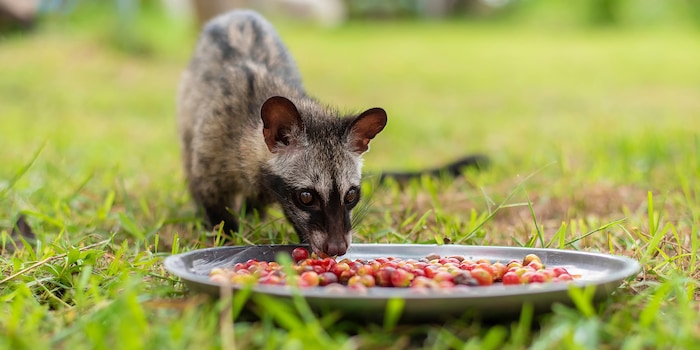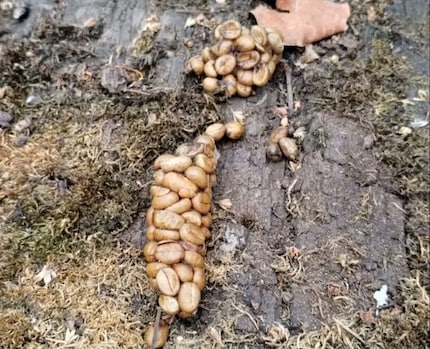
The mystery of the coffee from the cat's bum
Cats make everything better - including coffee. When civet cats eat the fruit, the pre-digested beans produce a particularly fine brew. Now there are clues as to why.
Civet coffee, which is produced when coffee beans take a small diversions through the intestines of a crawling cat, is considered the finest coffee in the world. The high-priced drink is milder, less bitter and less acidic than conventional coffee, but at the same time has a fuller flavour, according to connoisseurs. However, despite extensive research, it is still controversial why the coffee made from pre-digested beans, known as Kopi Luwak, tastes so different. A team led by Ramit Mitra from the Central University of Kerala in India has now compared civet coffee from the Kodagu region in south-west India with conventionally harvested coffee from the same region. As the team reports in the journal «Scientific Reports», the pre-digested beans contain more fats and fatty acid esters than directly harvested beans. This supports the theory that there are real chemical differences behind the perceived better flavour of civet coffee.
With prices of up to 400 dollars per kilogramme, civet coffee is the most expensive type of coffee in the world. That is why experts have long been trying to uncover its secret. According to most scientists, the decisive factor is that after the civet cat (Paradoxurus hermaphroditus) has eaten the beans, they are fermented by the microbes in the animal's gut. However, it is unclear which changes are decisive for the flavour. After all, not all coffee is the same; the flavour profiles can vary greatly even without the help of cats, the best known being the difference between the Robusta and Arabica bean varieties. And so, while there are a number of studies that have analysed the chemical characteristics of civet coffee, there is little consensus on what they mean.

Source: © Ramit Mitra, Central University of Kerala (Ausschnitt)
The Mitra team therefore collected the faeces of nocturnal civets, which are rich in coffee beans, in the coffee plantations of Kodagu. For comparison, they picked coffee beans directly from the surrounding trees and processed both types of beans as is customary in coffee production, but did not roast them in order to avoid the associated chemical changes. They measured and compared the proteins, sugars, acids, fats, caffeine and a class of substances called fatty acid methyl esters, FAME for short, contained in the beans. The latter in particular play a major role in the flavours in coffee; they help to distinguish between different varieties or to detect the addition of extenders.
The experts found differences in these FAMEs and the total fat content: they are not only significant, but in all likelihood also relevant. Fats change the mouthfeel of the coffee and strongly influence the perception of flavourings. FAMEs, on the other hand, are known flavourings in coffee, and the experts found two of them in higher concentrations: Octanoic acid methyl ester and decanoic acid methyl ester. Both have complex flavours with fruity, wine-like and spicy notes. Experts therefore suspect that these two differences contribute to the unique character of civet coffee. However, this is by no means the last word on Kopi Luwak. Civet coffee is produced in many regions. Studies suggest that there are therefore considerable differences within this type of coffee. Last but not least, Robusta beans are grown in Kodagu. However, most types of civet coffee are obtained from the milder Arabica variety. So there will probably still be a lot of beans travelling through cats' intestines before the mystery of civet coffee is really solved.
Spectrum of science
We are partners of Spektrum der Wissenschaft and want to make well-founded information more accessible to you. Follow Spektrum der Wissenschaft if you like the articles.
Original article on Spektrum.de
Experts from science and research report on the latest findings in their fields – competent, authentic and comprehensible.
From the latest iPhone to the return of 80s fashion. The editorial team will help you make sense of it all.
Show all